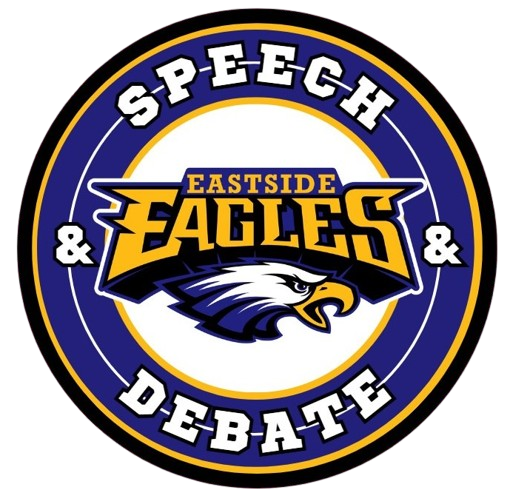Learn More
Speech and Debate is a huge club with a multitude of different events. Here are the events offered in South Carolina. You will see three different main categories. These are Public Address, Interpretation, and Debate.
Public Address Events
A category of events where you write and deliver a speech on a topic that interests you, or on a topic that you are given during the round.
Public Address
Original Oratory
Participants deliver a memorized 10 minute speech that they have written. The speech usually focuses on a societal issue, and aims to persuade the audience to make a choice. It lasts 10 minutes and includes a mix of factual information, personal anecdotes, quotes, and rhetorical.
Public Address
Expository
Participants deliver a memorized 5 minute speechthey have written that introduces to the audience a topic of the student’s choosing. The speaker should provide unique insights andexplore interesting implications. Effective speeches provide new information or perspectives on a topic,including those that are widely known.
Public Address
Extemporaneous
Participants are given a topic in the form of a question, generally something political, in a prep room and have 30 minutes to research, write, and memorize a 7 minute speech answering the question. After this 30 minutes passes, they give this speech with no notes.
Public Address
Informative
Participants deliver a memorized 10 minutes speech they have written. All topics must be informative in nature; the goal is to educate the audience. The main hook of this event is that speakers are heavily encouraged to use physical props in a creative manner to aid them in their speech.
Public Address
Impromptu
Participants are given 7 minutes in total to both write and deliver a speech on a topic they are given. Generally, topics are lighthearted or fun. Most often, students take 3 minutes to prepare to give their speech and then 4 minutes to give their speech.
Public Address
Declamation
(9th and 10th grade only)
Participants select and perform a speech given in public. Generally, only an excerpt or shortened version of the speech is given as speeches must be 10 minutes long. Speakers are not supposed to mimic the original speaker, but are encouraged to deliver the speech in an original and engaging manner.
Interpretation Events
A category of events where you take existing works, such as plays, tv shows, or books, and perform your own interpretation of them in a dramatic way.
Interpretation
Humorous Interpretation
Participants perform a 10 minute piece. Generally from a play, short story, or any published work, speakers portray multiple characters without using any props or costumes. Pieces are comedic and lighthearted in nature.
Interpretation
Dramatic Interpretation
Participants perform a 10 minute piece. Again, these generally come from a play, short story, or any published work. Performers convey emotion with a focus on character development and depth.
Interpretation
Duo Interpretation
Two participants perform together using a 10 minute piece from a play, or any published work. competitors convey emotion and environment through interaction with the duo partner. The catch comes in that partners are not allowed to look at or touch each other during the performance.
Interpretation
Prose/Poetry
Competitors read from a selected 10 minute piece of poetry or prose. In this event, less focus is placed on gestures, and more is placed on the vocal delivery of the work and effective narration.
Interpretation
Programmed Oral Interpretation
Using a combination of different types of works such as prose, poetry, and drama, competitors create a 10 minute program. The purpose of this event is to combine multiple genres and using transitions between these pieces to focus on a central theme.
Interpretation
Children's Literature
This is a service description. Add more detail about this service, such as benefits, appearance, components and value
Debate
A category of events where you go head to head discussing real world issues with people from other schools.
Debate
Congressional Debate
Competitors act exactly like a congressperson. In preparation for the event, competitions are given a list of bills they can write speeches on. In a chamber with people from schools all over the district, they will deliver 3 minute speeches arguing for or against proposed bills, and take questions from other competitors. This cycle will go until an eventual vote on the bill, and moving on to the next.
Debate
Lincoln-Douglas
In a direct 1v1 debate, competitors from different schools argue a prepared resolution. Debaters go back and forth giving speeches, thus being able to think quick on your feet and organize your thoughts is very important. Debate in Lincoln-Douglas focuses more on a philosophical/moral level when compared to other debate events.
Debate
Public Forum
In a 2v2 debate, competitors go back and forth between their teams arguing on a prepared resolution. Between every couple speeches, competitors will directly ask each other questions during a "crossfire" Compared to Lincoln-Douglas, public forum is much more focused on policy and effects rather than moral decision making.
